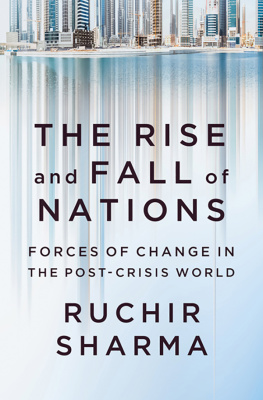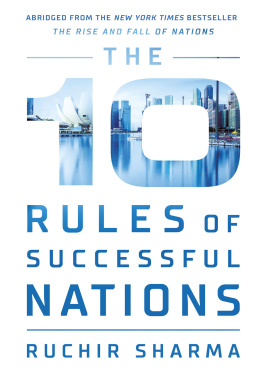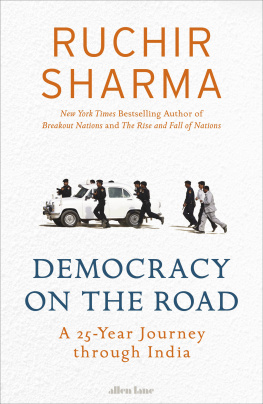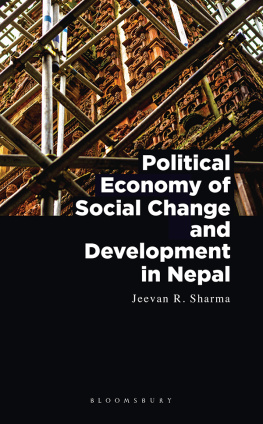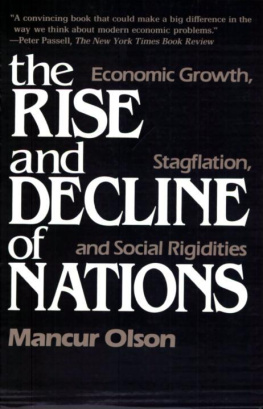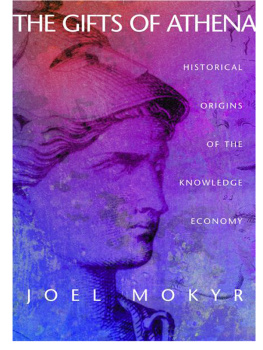For the first two decades of my alternative career as a writer, I was resigned to author Christopher Hitchenss advice: Everybody does have a book in them, but in most cases thats where it should stay. I was comfortable writing op-eds, but the thought of writing a book seemed much too daunting. All that changed thanks to Tony Emerson, who left his job as the editor of Newsweek International in 2010 to help me pen Breakout Nations. He has since become my partner in crime for all my writing ventures. Once the book writing bug gets to you, there is no letting the ideas stay in you. The Rise and Fall of Nations is my latest project again made possible with Tonys help.
Led by Jitania Kandhari, I am fortunate to have arguably one of the best research teams to help me think about the way the world is working. I have interacted with Jitania since 1998 and can only marvel at her boundless energy and enthusiasm for economic research. I am eternally grateful to her for being there for me whenever I have needed any guidance or assistance. She is supported by Steven Quattry, who must be the most well-read person I have ever met. His interests go well beyond the field of economics and politics, and his lateral thinking has contributed significantly to my understanding of the world. I would also like to thank team member Soham Sengupta for his fast and clear answers to any question. It is hard to imagine, though, how I could get anything done without Paul Weiner. He has been the teams quartermaster and more for over a dozen years and has been involved in all my endeavors. His organizational skills were once again critical in putting this book together in New York, and quick-thinking Christine Dsouza plays a similar role in Mumbai.
Ever since I started writing in 1991, my sister Shumita Deveshwar has been there to constantly support me, from storing clippings of relevant newspaper articles as part of a mini-library at home to offering critical comments on all the pieces I have written. Before Tony arrived on the scene, Shumita would drop everything to edit my articles at virtually a moments notice, and even for this book she took out large chunks of time to improve the prose. There is nothing that I can possibly do to repay the unconditional support I have received from her as well as from my parents, who have indulged my idiosyncratic behavior from the get-go.
My close friend and mentor Simran Bhargava has probably had the biggest influence on my thinking and writings over the years. She also taught me how, in Rudyard Kiplings words, to keep your head when all about you are losing theirs. Simran spent hours reading and rereading drafts of the chapters, and her way with questions triggers the mind to come up with more insights and anecdotes. Simran is a simpatico and has instilled in me the basic lesson of writing that if you cant explain something simply, it means you havent understood it well enough.
There are few acts as selfless as reading someone elses book line by line and offering detailed feedback. I have been incredibly fortunate to find many people who have been so generous with their time. Pierre Yared of Columbia University devoured the manuscript in a week and made some of the most discerning observations that I could hope for, helping me to sharpen the narrative. I would like to thank Amy Oldenburg for making this introduction and also for all her support in my writing endeavors. Dorab Sopariwala, counted as one of Indias most respected researchers with an amazing eye for detail, along with Rahul Sharma, who has worked in various leading editorial roles, went over the manuscript with a fine-tooth comb and offered some very valuable suggestions. My friend Sabah Ashraf too scoured the book and came up with key big-picture observations.
My colleagues at work, Ashutosh Sinha, Paul Psaila, Jim Upton, Swanand Kelkar, and Amay Hattangadi, all spent a meaningful amount of time scanning the text and helping to improve it. I would like to thank the following other members of my team for their contributions on specific chapters and topics: Tim Drinkall, Eric Carlson, Cristina Piedrahita, Gaite Ali, Pierre Horvilleur, Vishal Gupta, Jorge Chirino, Samuel Rhee, Munib Madni, May Yu, and Gary Cheung. Cyril Moulle-Berteaux has long been my intellectual sparring partner and I brainstormed with him on many ideas for The Rise and Fall of Nations. He has the best analytical mind of anyone I know, and I am grateful to him for his thoughts on various topics touched upon in the book.
I was delighted to have some of the sharpest editors in the business find it worth their while to take such interest in this project. Stuart Proffitt at Allen Lane and Brendan Curry at Norton took an inordinate amount of time both to streamline the prose and to save me from any blushes. Once again, facilitating all this was my agent, the legendary Andrew Wylie, and I am gratified to be part of his roster. I am also obliged to Andrews associate in London, James Pullen, for his support in this venture.
As both an investor and a writer, I am fortunate to have access to reports prepared by various research firms across the world and also opportunities to speak with the analysts working at these firms. While it is hard for me to list the names of all the analysts I have spoken with in connection with the book, I would like to particularly thank Dan Fineman.
Fareed Zakaria is an inspiration to many people in the sphere of current affairs, and I have been lucky enough to have him as a close friend. Over long dinner conversations, we have tried to solve many of the worlds problems. More significantly, he has repeatedly emphasized to me the importance of writing a book by stressing the role it plays in deepening ones intellectual capital. Fareeds words and constant encouragement have been vital for me to put pen to paper.
When I look back at all the people who have helped me in this project, I am struck by the magnanimity that exists in this world. I cant be grateful enough to the remarkable set of people who have carved time out to indulge me in my passion for writing. While thanking each of one of them for their immense contribution, I am reminded of this exchange between two senior politicians from the same alma mater. When signing the college yearbook at a reunion, one wrote, I am who I am because of the college. To which the other followed with the line Why blame the college? Similarly, the people acknowledged here are not to blame if my book does not appeal to you in the end.
ALSO BY RUCHIR SHARMA
Breakout Nations:
In Pursuit of the Next Economic Miracles
ABOUT THE AUTHOR
Ruchir Sharma is head of emerging markets and chief global strategist at Morgan Stanley Investment Management, with more than $20 billion of assets under management. He travels widely, spending one week every month in a different country, where he meets leading politicians, top CEOs, and other local characters.
Sharma has been a writer for even longer than he has been an investor. He is a frequent contributor to the op-ed pages of the Wall Street Journal, the Financial Times, and the Times of India. His essays have appeared in Foreign Affairs, Time, the New York Times, Foreign Policy, Forbes, and Bloomberg View. For much of the last decade, he had been a contributing editor with Newsweek, where he wrote a regular column titled Global Investor. His first book, Breakout Nations: In Pursuit of the Next Economic Miracles, debuted as the number one bestseller in India, was a Wall Street Journal bestseller, and was chosen by Foreign Policy as one of its 21 Books to Read in 2012.
Bloomberg named Sharma one of the 50 Most Influential People in the world in October 2015. In 2012, he was selected as one of the Top Global Thinkers by
Next page
